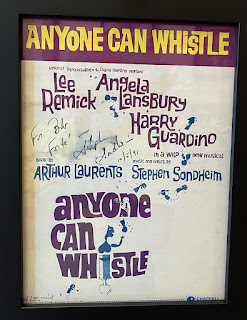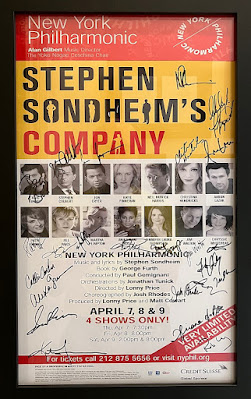He was a cultural deity, the leading musical artist of
our age, always on the cutting edge of American theater, the consummate artist,
his lyrics totally integrated with his music. If Bob Dylan is deserving of the Pulitzer,
seems to me that Sondheim is as well.
Although a “musical theatre” figure, he is far more, a poet whose lyrics
captured the urbanity of modern life and chronicled human relations in dramas
within a musical structure. His musicals
have as much in common with opera as they do with Broadway theatre (although
Sondheim himself did not generally enjoy opera).
If you look at one’s life as a piece of music, there may
be a few long measures preceded by a rest notation. Covid not only led to sickness and death, but
also took large blocks of our lives away, experiences we can never
recover. It’s like a musical piece where,
suddenly, the rest notation is unnaturally prolonged, taking up space where
there should be music. The older one is,
the more that horridly mismanaged illness is a percentage of one’s remaining life.
Thus the pandemic marked the loss of experiences, such as
the one I wrote about involving the reimagined production of Sondheim’s Company and our 50th Wedding
Anniversary.
Although we missed that moment, we had hoped there would
be another, and then the following year Sondheim passed away. After his death I learned about the letters
he wrote to others, even selflessly responding to strangers like me who revered
him.
He had an extensive exchange of letters with Robert
Osborne who for so many years was the face of Turner Classic Movies. Watching the classic movies on TCM is just
about the only TV I truly enjoy.
Sondheim also had an intense interest in such films,
particularly those of the thirties, such as ones starring Joe E. Brown, and a
host of other stars from that era. Where
in the world did he find the time to watch all of these? I think of him, steeped in nostalgia and
pastiche. He once said something along
the lines that if he was on a trip and a customs officer asked him where he’s
from, he’d reply, “the past.” He wrote
to Osborne, a kindred soul, formed a mutual admiration society, and obviously
Osborne kept him well supplied in tapes of films mostly from that era.
I’ve been able to collect ten of those letters. Eighty-five were auctioned off in London in
2018 so my collection represents only a portion of their exchanges. I framed the ones I collected and they now
grace our hallway with other Sondheim memorabilia. I’ve transcribed the contents of the ones I
have below for future Sondheim scholars.
They are fascinating, such as the September 5, 2006
letter in which he says “As for Angie's interview, do you by any chance have an
unedited audiotape of it? I'd love to hear what she said.” That must have been Osborne’s interview of Angela
Lansbury who originated the role of the mad meat pie maker Mrs. Lovett in
Sondheim’s Sweeney Todd and was in
Sondheim’s early short-lived musical Anyone
Can Whistle (1964). Lansbury said Sweeney Todd was a huge success for her
and that the show was a benchmark for Sondheim and “finally, down the road,
that is the [Broadway] role” for which she’ll be remembered. (Watching that interview reminds me of the gift Osborne had, such a gentle, probing ability to get the best from an interview.)
The one dated Jan. 3, 2008 was on the eve of the
financial (and ultimately political) crisis, and Sondheim concludes it with “Meanwhile,
Happy New Year to all of us, please God” – something we were all feeling at the
time.
Or the July 28, 2010 letter, the only one not signed
“Steve,” which he signs “Affectionately Yours, Merle” obviously an in-joke, and
not seeing what preceded it I’m guessing it was a reference to Merle Oberon.
The June 27, 2011 letter requests that Osborne send the
tape of "London Can Take It;" as he wanted “Jeff to understand what
went on during wartime there,” presumably Jeff being his husband-to-be at the time,
Jeffrey Romley. Or, the last Sondheim –
Osborne letter I have dated June 12, 2012 requesting “Act One,” a 1963 film
based on Moss Hart’s autobiography. As
he explains “James Lapine has been trying to track a copy down because he's
writing a play based on the book.” The
play premiered on Broadway in 2014 to good reviews.
There are so many interesting references in these
letters, so I’ll let these transcriptions do the talking themselves:
August
31, 1998
Dear Bob –
Thanks so much. What can I do for you?
Steve S.
*****
December 18,
2003
Dear Bob -
What I do with TCM is tape the movies and watch them
days, weeks or even months later. I don't remember which Gordon Douglas, but it
was in the midst of the Gordon Douglas festival a few months back. I didn't mean to keep you awake nights when I
brought this whole thing up -- my apologies.
You got me on "Whispering Streets.” If it's part of
the TCM catalogue, make a copy for me. (I'm only up to the C's at the moment,
but compiling as I go along.) And as far as Madelon Claudet and Rachel Cade go,
what about Harold Diddlebock?
Meanwhile, have a Christmas worthy of Ann Harding and
George Raft, or even Deanna Durbin and Gene Kelly.
Best,
Steve
*****
September 5,
2006
Dear Bob –
Thanks, as always, for your generosity. I can't believe
the number of movies that Joan Blondell made. It seems she made one out of
every two movies that were released before 1940. As for Angie's interview,
do you by any chance have an unedited audiotape of it?
I'd love to hear what she said.
Does your visit to Telluride have anything to do with
Bill Pence's resignation? When I was there so was Ted Turner.
Surely, these can't be coincidences..
That was a
joke,
Steve
P.S. Is "Down on Ami-Ami-Oni-Oni Isle" from
"The Hurricane"? I suspect not.
SS
*****
January 3,
2008
Dear Bob –
Thanks for the DVD. One of the things I love about the
series films is that people like Audrey Totter and Dennis O'Keefe show up in
them in tiny roles.
Meanwhile, Happy New Year to all of us, please God.
Gratefully,
as ever,
Steve
*****
January 5,
2010
Dear Bob
For the thousandth time, thank you so much! When are you
coming to our fair city next? Give me a little notice, and we'll have an
in-depth conversation about Rondo Hatton.
Meanwhile, Happy New Year.
Steve
*****
July 28, 2010
Dear Bob -
The new recorder didn't arrive in time, so please add the
following to your list: "Eleven Men and a Girl"; "Top
Speed"; "Broadminded"; "Going Wild"; Local Boy Makes
Good"; "Sit Tight"; & Day Bike Rider"; "Bright
Lights.”
I don't expect these till 2012 at the earliest.
Affectionately Yours,
Merle
*****
June 27, 2011
Dear Bob -
Thanks so much, as always, for dredging up the movies. By
all means, keep them coming if you can. I'm particularly grateful for
"London Can Take It;" as I want Jeff to understand what went on
during wartime there.
I'd like to add four more titles to the lengthy list:
“The Man with Two Faces," "Innocence,"
"Gates of Heaven" and "Trouble the Water."
What can I do for you in return? Since you're getting
some evenings off, perhaps when you're in New York you'd like to come to dinner
and we'll talk about Johnny Sheffield. Seriously, just let me know.
As always,
Steve
*****
August 2, 2011
Dear Bob
The usual request: I screwed up trying to tape "On
with the Show' and "Going wild," so please add them to your list.
You're looking more chipper than ever - maybe it was
anticipating your vacation. If you spend any of it in New York, give me a call
and we can have a drink at least.
Steve
*****
September 8,
2011
Dear Bob -
Just to ruin your vacation, would you add the following
four movies to the list of Things My VHS Machine Screwed Up:
"Crooner," "Guele d'Amour," "Virtue," "No
More Orchids"?
As always,
Steve
*****
June 12, 2012
Dear Bob -
Is "Act One" in the Turner Classic Movies
library? It's a Warner Bros. picture, so I thought I'd ask. James Lapine has
been trying to track a copy down because he's writing a play based on the book.
Can you help him out?
Hope you're thriving -- you certainly seem to be, in your
public appearances.
Best,
Steve
Alongside these letters is a framed Sondheim-signed sheet
music of “Anyone Can Whistle”. It reads
“For Bob Forte’” and as he dates it
10/5/91, well before TCM, perhaps this not dedicated to Osborne. So when I play that piece I do so Forte’!
The opposite wall is devoted to Company Playbills surrounding a cast-signed New York Philharmonic poster
of the 2013 production of Company which
included such luminaries as Stephen Colbert, Jon Cryer, Neil Patrick Harris, and
Patti LuPone, among others. (Yes, Colbert and Cryer who we don’t think of in
the context of musical theater do credible work in this production which was
aired by PBS that year.)
We’ve made that hallway in our home a memorial to him. Thus,
“Not a day goes by / Not a single day / …you're somewhere a part of my life.”
‘Sunday’ from Sunday
in the Park with George is one of his masterpieces. I include a brief video of my playing it as I often do with him in mind. There will
never be another Sondheim.






